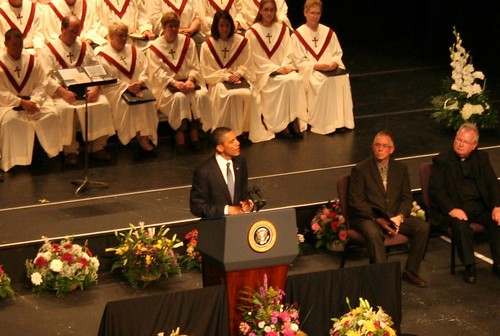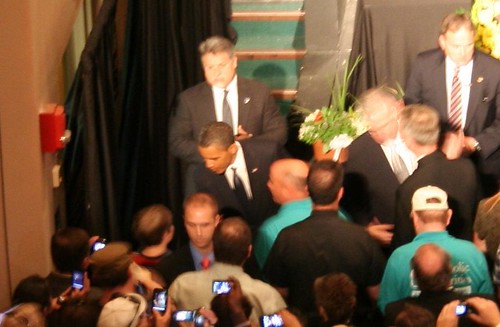Previously: President Obama in Joplin

A vehicle parked in the field northeast of the Missouri Southern State University campus
which was a designated parking area for those attending the memorial service.
Blue Girl and I made the round trip drive to Joplin (about four hours each way for a total of over 400 miles) to cover the “Joplin Community Memorial Service” on Sunday afternoon at the Taylor Performing Arts Center on the campus of Missouri Southern State University. Members of the clergy from Joplin spoke, as did Missouri Governor Jay Nixon and President Barack Obama. Statewide officeholders in attendance included Senator Claire McCaskill, State Treasurer Clint Zweifel, and Attorney General Chris Koster.

The Missouri National Guard controlled the perimeter of the campus and directed those attending to parking.

The audience in the balcony.

A few minutes before the memorial service began these individuals on the first row of the balcony unfurled an American flag.

Missouri Governor Jay Nixon spoke and then introduced President Obama.

President Obama on the stage.
The transcript of President Obama’s remarks, compiled from the White House transcript and our audio recording:
[cheers, applause] ….President Obama: Thank you. Thank you so much. Please, please be seated.
[voices from audience: “I love you, Obama!” “We love you!”][cheers]
President Obama: I love Joplin! [applause] I love Joplin.
[voice from audience: “We love Joplin!”][cheers, applause]
President Obama: We love Joplin. [applause]
Thank you, Governor, for that powerful message, but more importantly, for being here with and for your people every step of the way. We are grateful to you, to Reverend Gariss, Father Monaghan. I’m so glad you got in that tub. [laughter, applause][voice: “Yeah!] [cheers, applause] To Reverend Brown for that incredibly powerful message. [cheers, applause] To Senator Claire McCaskill, who’s been here, and Congressman Billy Long, Mayor Woolston. To Craig Fugate. It doesn’t get a lot of attention, but he heads up FEMA, our emergency response at the federal level. Uh, he’s been going from Tuscaloosa to Joplin and everywhere in between, uh, tirelessly doing out, outstanding work. We’re grateful for him. Gail McGovern, uh, the President of the National Red Cross, which has contributed mightily to the rebuilding efforts here. Most of all, to the family and friends of all those who’ve been lost and all those who’ve been affected…


…Today we gather to celebrate the lives of those we’ve lost to the storms here in Joplin and across the Midwest, to keep in our prayers those still missing, to mourn with their families, to stand together during this time of pain and trial.
And as Reverend Brown alluded to, the question that weighs on us at a time like this is, Why? Why our town? Why our home? Why my son, or husband, or wife, or sister, or friend? Why?
We do not have the capacity to answer. We can’t know when a terrible storm will strike, or where, or the severity of the devastation that it may cause. We can’t know why we’re tested with the loss of a loved one, or the loss of a home where we’ve lived a lifetime.

These things are beyond our power to control. But that does not mean we are powerless in the face of adversity. How we respond when the storm strikes is up to us. How we live in the aftermath of tragedy and heartache, that’s within our control. And it’s in these moments, to our actions, that we often see the glimpse of what makes life worth living in the first place. In the last week, that’s what Joplin has not just taught Missouri, not just taught America, but has taught the world. I was overseas in the aftermath of the storm and had world leaders coming up to me saying, let the people of Joplin know we are with them [cheers, applause] we’re thinking [inaudible][applause]
Because the world saw how Joplin responded. A university turned itself into a makeshift hospital. [applause, cheers] Some of you used your pickup trucks as ambulances, carrying the injured[applause],on doors that served as stretchers. Your restaurants have rushed food to people in need. Businesses have filled trucks with donations. You’ve waited in line for hours to donate blood to people you know, but also to people you’ve never met. And in all this, you have lived the words of Scripture: “We are troubled on every side, yet not distressed. We are perplexed, but not in despair. Persecuted, but not forsaken. Cast down, but not destroyed.”
As the governor said, you have shown the world what it means to love thy neighbor. You’ve banded together. You’ve come to each other’s aid. You’ve demonstrated a simple truth, that heartbreak and tragedy, no one is a stranger. Everybody is a brother. Everybody is a sister. [applause] We can all love one another.
As you move forward in the days ahead, I know that rebuilding what you’ve lost won’t be easy. I just walked through some of the neighborhoods that have been affected, and you look out at the landscape, and there have to be moments where you just say, where to begin? How to start? There are going to be moments where after the shock has worn off, you feel alone. But there’s no doubt in my mind what the people of this community can do. There’s no doubt in my mind that Joplin will rebuild. And as President, I can promise you your country will be there with you every single step of the way. [applause, cheers] We will be with you every step of the way. We’re not going anywhere. [applause] The cameras may leave. The spotlight may shift. But we will be with you every step of the way until Joplin is restored and this community is back on its feet. We’re not going anywhere. [applause, cheers] That is not just my promise, that’s America’s promise. It’s a promise I make here in Joplin, it’s a promise I made down in Tuscaloosa, or in any of the communities that have been hit by these devastating storms over the last few weeks.
Now, there have been countless acts of kindness and selflessness in recent days. We’ve already heard the record of some of that. But perhaps none are as inspiring as what took place when the storm was bearing down on Joplin, threatening an entire community with utter destruction. And in the face of winds that showed no mercy, no regard for human life, that did not discriminate by race or faith or background, it was ordinary people, swiftly tested, who said, “I’m willing to die right now so that someone else might live.” It was the husband who threw himself over his wife as their house came apart around them. It was the mother who shielded her young son. It was Dean Wells, a husband and father who lov
ed to sing and whistle in his church choir. Dean was working a shift at the Home Depot, managing the electrical department, when the siren rang out. He sprang into action, moving people to safety. Over and over again, he went back for others, until a wall came down on top of him. In the end, most of the building was destroyed, but not where Dean had directed his coworkers and his customers. There was a young man named Christopher Lucas who was twenty-six years old. Father of two daughters, third daughter on the way. Just like any other night, Christopher was doing his job as manager on duty at Pizza Hut. And then he heard the storm coming. It was then when this former sailor quickly ushered everybody into the walk-in freezer. The only problem was, the freezer door wouldn’t stay closed from the inside. So as the tornado bore down on this small storefront on Range Line Road, Christopher left the freezer to find a rope or a cord or anything to hold the door shut. He made it back just in time, tying a piece of bungee cord to the handle outside, wrapping the other end around his arm, holding the door closed with all his might. And Christopher held it as long as he could, until he was pulled away by the incredible force of the storm. He died saving more than a dozen people in that freezer. [applause]

You see, there are heroes all around us, all the time. They walk by us on the sidewalk, and they sit next to us in class. They pass us in the aisle wearing an orange apron. They come to our table at a restaurant and ask us what we’d like to order. Just as we can’t know why tragedy strikes in the first place, we may never fully understand where these men and women find the courage and strength to do what they did. What we do know is that in a split-second moment where there’s little time for internal reflection or debate, the actions of these individuals were driven by love, love for a family member, love for a friend, or just love for a fellow human being.
That’s good to know. In a world that can be cruel and selfish, it’s this knowledge, the knowledge that we are inclined to love one another, that we’re inclined to do good, to be good, that causes us to take heart. We see with fresh eyes what’s precious and so fragile and so important to us. We put aside our petty grievances and our minor disagreements. We see ourselves in the hopes and hardships of others. And in the stories of people like Dean and people like Christopher, we remember that each us contains reserves of resolve and compassion. There are heroes all around us, all the time.
And so, in the wake of this tragedy, let us live up to their example [applause], to make each day count, to live with the sense of mutual regard, to live with that same compassion that they demonstrated in their final hours. We are called by them to do everything we can to be worthy of the chance that we’ve been given to carry on.
I understand that at a memorial yesterday for Dean, his wife decided to play a recording of Dean whistling a song he loved, Amazing Grace. The lyrics are a fitting tribute to what Joplin has been through. “Through many dangers, toils and snares I have already come. ‘Tis Grace that brought me safe thus far and Grace will lead me home.[applause] Yea, when this flesh and heart shall fail, And mortal life shall cease, I shall possess within the veil, A life of joy and peace.”
May those we’ve lost know peace, and may grace guide the people of Joplin home. God bless you, and God bless the United States of America. Thank you. [applause, cheers]
After President Obama’s remarks, a closing hymn, and a benediction by Father Justin Monaghan the President and Governor Jay Nixon greeted tornado survivors in the front rows of the auditorium.




Missouri State Treasurer Clint Zweifel speaks with a radio reporter about the memorial service after the service.

Missouri Attorney General Chris Koster speaking with individuals outside after the service.

























